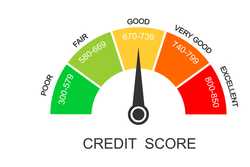How to Get a Credit Report

Our evaluations and opinions are not influenced by our advertising relationships, but we may earn a commission from our partners’ links. This content is created by TIME Stamped, under TIME’s direction and produced in accordance with TIME’s editorial guidelines and overseen by TIME’s editorial staff. Learn more about it.
Your credit scores tell lenders how responsibly you manage credit and debt. These scores, which range from 300 to 850, don't just appear out of thin air. They're calculated using information in your credit reports.
Credit reports contain important details about your debts, such as payment history and how much you owe. Equifax, Experian, and TransUnion are the three major credit bureaus that collect this information, compile credit reports, and generate credit scores.
If you're interested in how to get a credit report, there are different options, including ways to get one for free.
When you check your own credit reports, it generates what's called a soft credit pull. A soft credit check won't impact your credit scores at all and you're free to check your credit reports as often as you'd like.
Reviewing your credit reports regularly can help you see what might be helping or hurting your credit scores. It's also an opportunity to check for any errors or potentially suspicious or fraudulent activity.
Copies of your credit report can be acquired for free or for a fee.
Federal law allows consumers to request a free copy of their credit reports from each of the three major credit bureaus. The original law permitted this only once a year, but during the pandemic that was extended to weekly. And that weekly free report from all three bureaus is now permanent, the Federal Trade Commission reports..
Here's how you can get your free credit reports:
You There are a few situations where you might be able to get additional free copies beyond the free-report-per-week from each bureau. That special rule could apply if you:
State law may also permit you to request additional copies of your credit reports for free.
Pro tip: Free weekly credit reports are available at AnnualCreditReport.com through the end of 2023.
A second option is to request a credit report from the credit bureaus directly. Whether you pay for your reports or not depends on the bureau.
Here's what each of the three major credit bureaus offers for free.
All three credit bureaus also offer additional services for a fee.
Credit bureaus aren't required to offer credit scores along with credit reports since they're two different things. If you're getting a credit report and score from one of the credit bureaus, it's important to know which score you'll see.
FICO scores are most widely used by lenders. These scores are based on five factors:
VantageScores use the same range as FICO scores (300 to 850) but they're calculated differently. For that reason, your FICO scores and VantageScores may be different.
It's also important to keep in mind that your credit reports may not include the same information. For example, if you have an auto loan, your lender might only report your account activity to one or two credit bureaus rather than all three. That can affect the way each credit bureau calculates your score.
FICO’s consumer division is myFICO, which, as mentioned, provides a model for generating credit scores. In addition to offering credit education online, myFICO also provides credit monitoring services.
There are three plans to choose from.
Are credit reports worth paying for? They might be, if you'd also like to be able to view updated credit scores or see specific types of FICO scores. For instance, there are different models that are used to calculate your scores for mortgage loans and auto loans.
Plans from myFICO also offer tools to help monitor and protect your identity. That's something you might appreciate if you're worried about fraud or identity theft.
In addition to the credit bureaus and myFICO, there are other companies that offer credit monitoring services. These services can track changes to your credit reports that might affect your credit scores. They can also include free credit report access.
You might only get access to your credit reports from one of the three bureaus. But that could still be helpful for seeing what's happening with your credit from month to month.
Some credit monitoring services can also offer free credit score updates each month. Again, it's important to know whether you're getting a FICO score or a VantageScore if you're signing up specifically for that benefit.
If you have a credit card, you might have an opportunity to check your credit reports and/or scores for free each month.
Discover, for example, offers cardholders access to its Scorecard feature. With Scorecard, you can see what's impacting your score positively or negatively, based on the information in your TransUnion credit file. You can also get your TransUnion FICO score free each month.
Log in to your credit card company's online account dashboard to see if credit reporting or scoring are available to cardmembers.
There's no fixed rule for how often you need to check your credit reports. It's a good idea to check at least once a year, but you might check them more often if you're working on improving your credit and you want to see what kind of progress you're making. Regular credit report checkups could also make sense if you're worried about fraud.
As you review your reports, it helps to know what to look for. Here are a few things to keep in mind.
If you find an error in your credit report, you have the right to dispute it. You'd need to dispute it with the credit bureau that's reporting the information you believe to be inaccurate. All three credit bureaus accept disputes online, by mail, or over the phone.
Once you submit a dispute, the credit bureau has to investigate it. If the bureau determines that there's an error, it either has to correct it or remove it from your report. That could potentially add a few points to your credit score.
You'll be notified in writing about the outcome of your dispute, regardless of whether it goes in your favor or not.
Credit reports can be a useful tool for judging how you're doing financially and how well you will be perceived by lenders. The better the report, the better terms you’ll likely be offered. Knowing all the ways to get a credit report makes it easier to check yours should you need to see what's in your credit file.
AnnualCreditReport.com offers free credit report access to consumers. You can now get a free credit report from each of the three major credit bureaus every week—previously it was just once a year..
AnnualCreditReport.com provides credit reports from Equifax, Experian, and TransUnion, the three major credit bureaus. Whether one of these reports is better than another depends on the information that's being reported. The best free credit report is the one that includes the most comprehensive information about your credit and debt accounts.
You can request a free copy of your credit report from AnnualCreditReport.com at any time, but you're limited to once a week per bureau. If you're getting free (or paid) credit reports from the credit bureaus, those are usually updated on a monthly basis.
The information presented here is created by TIME Stamped and overseen by TIME editorial staff. To learn more, see our About Us page.





